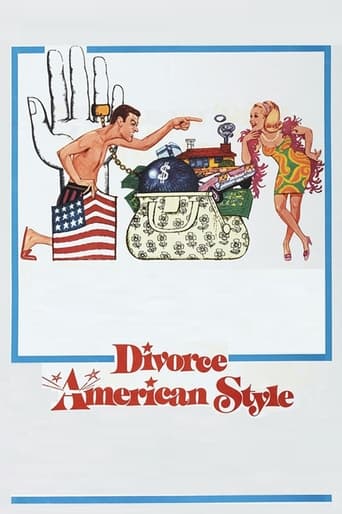If you thought divorce was ugly, try marriage!
"Divorce American Style" (1967), a biting satire produced by Tandem Enterprises Inc. and National General Production Inc., offers a scathing look at the disintegration of marriage in the United States. Directed by Bud Yorkin and penned by Norman Lear, the film delves into the lives of Richard and Barbara Harmon, portrayed by Dick Van Dyke and Debbie Reynolds, respectively. As their seemingly perfect suburban life unravels, the couple navigates the complexities and absurdities of divorce, highlighting the societal pressures and financial strains that often accompany marital dissolution. The film's sharp wit and keen observations on the American family dynamic make it a poignant commentary on the era's social mores. Set against the backdrop of 1960s America, "Divorce American Style" captures the zeitgeist of a nation grappling with shifting values and the breakdown of traditional family structures. The film cleverly juxtaposes the Harmon's domestic turmoil with the broader cultural landscape, using humor to underscore the often ridiculous nature of divorce proceedings and the legal system. Through a series of comedic yet poignant scenes, the movie exposes the superficiality and materialism that can drive couples apart, offering a critique that remains relevant decades later. The performances of Dick Van Dyke and Debbie Reynolds are central to the film's success, as they skillfully navigate the transition from a loving couple to estranged partners. Van Dyke's portrayal of Richard Harmon is both sympathetic and satirical, capturing the confusion and desperation of a man caught in the throes of divorce. Reynolds, on the other hand, brings a mix of vulnerability and resilience to her role as Barbara, embodying the strength and determination required to move forward. Their chemistry and comedic timing elevate the film, making it a memorable exploration of love and loss. "Divorce American Style" not only serves as a time capsule of 1960s America but also as a timeless reflection on the complexities of marriage and divorce. Produced by Tandem Enterprises Inc. and National General Production Inc., the film's enduring appeal lies in its ability to blend humor with social commentary, offering audiences a mirror to their own experiences. As the Harmon's journey unfolds, viewers are invited to laugh, reflect, and perhaps even reconsider their own views on the institution of marriage and the societal forces that shape it.
Año1967
Duración109 minuto
GénerosComedia
Países de producciónUnited States of America
